In a significant move to strengthen public health across the Caribbean, the Pan American Health Organization (PAHO) and the Caribbean Community (CARICOM) have signed a Joint Subregional Cooperation Strategy aimed at addressing common public health challenges in the region.
The agreement was signed on Tuesday by PAHO Director Dr. Jarbas Barbosa and CARICOM Secretary-General Dr. Carla Barnett during Dr. Barbosa’s official visit to Guyana this week.
The strategy will support technical cooperation efforts across 15 CARICOM Member States — including Barbados, Jamaica, and Trinidad & Tobago — and five Associate Members such as Bermuda and the Cayman Islands.
“This signing marks a milestone in a long-standing partnership built on trust, mutual respect, and a shared vision for health and wellbeing in the Caribbean,” said Dr. Barbosa during the signing ceremony.
Responding to Shared Health Threats
The new strategy reflects a coordinated response to the Caribbean’s unique and interconnected public health challenges, from the rising burden of non-communicable diseases (NCDs) to the ongoing climate change crisis and the need for digital transformation and stronger health systems.
“These challenges do not stop at borders — and neither should our solutions,” Dr. Barbosa emphasized.
CARICOM Secretary-General Dr. Carla N. Barnett praised the strategy, calling it a “historic moment” in the PAHO–CARICOM partnership.
“PAHO has been instrumental in shaping our public health policies and systems, ensuring that we continue to prioritize the health of our communities,” she said.
Guyana’s Minister of Health, Dr. Frank Anthony, added:
“This strategy reaffirms that health is not just a service; it is a right. In the Caribbean, that right should not be determined by where you live, your income, or your age.”
Five Strategic Priorities of the New Health Strategy
The joint strategy outlines five main areas of focus for PAHO’s technical cooperation within the Caribbean:
-
Strengthening health system resilience through primary health care.
-
Advancing climate adaptation and disaster preparedness to improve environmental sustainability and health security.
-
Promoting multisectoral action to tackle NCDs, mental health conditions, violence, and injuries. This includes:
-
Policies to reduce risk factors for NCDs,
-
Implementation of PAHO’s “Better Care for NCDs” initiatives,
-
Elimination strategies for cervical cancer.
-
-
Preventing and eliminating communicable diseases of regional priority through coordinated subregional efforts.
-
Enhancing technical cooperation via partnerships, resource mobilization, and advocacy. This includes the creation of a CARICOM-PAHO cooperation framework to better access resources and influence health policy decisions.
“As we sign this strategy, let us renew our commitment to working together — not only as institutions, but as partners and as a community united in purpose,” Dr. Barbosa concluded.























Discussion about this post